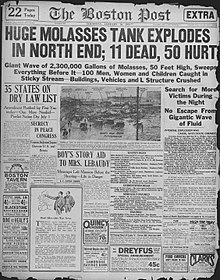The Boston Post was a newspaper published in Boston, Massachusetts between 1831 and 1956. It was one of the most popular daily newspaper in New England for over a hundred years. The Post was founded in November 1831 by two businessmen: Charles G. Greene and William Beals. By the 1930s, The Boston Post had grown to be one of the largest newspapers in the country, with well over a million readers.
 The front page of The Boston Post (January 16, 1919) | |
| Type | Daily newspaper |
|---|---|
| Format | Broadsheet |
| Owner(s) | Post Publishing Company |
| Founded | 1831[1] |
| Language | English |
| Ceased publication | 1956 |
| Headquarters | 42 Congress Street; Corner Devonshire & Water Streets; 15–17 Milk Street Boston, Mass., |
During the 1940s, the newspaper faced more and more competition from papers published by William Hearst. More people began listening to the news on radio and television, and the paper's business began to suffer. It stopped being published in October 1956. At the time, it was printing about 255,000 copies of its daily issue, and about 260,000 of its Sunday edition.[2]
Writers
change- Richard Frothingham, Jr. – an historian, journalist and politician who was a proprietor and managing editor of The Boston Post.
- Olin Downes – music critic.[3]
- Olga Van Slyke Owens Huckins – literary editor from 1941 to 1954.[4] Huckins letter to Rachel Carson inspired the book Silent Spring.[5][6]
Sunday magazine
changeThe Boston Sunday Post
September 18, 1910.
In the Sunday paper every week was included a weekly magazine. It was originally called "The Sunday Magazine of The Boston Sunday Post" and later "The Boston Sunday Post Sunday Magazine".
Pulitzer Prize
change- 1921 – Meritorious Public Service. The Boston Post was awarded the Pulitzer Prize for its investigation into and its exposure of fraud by Charles Ponzi. It was the last Pulitzer won for public service awarded to a Boston newspaper until the Globe won it in 2003.
Boston Post Cane
changeThe Boston Post Cane was an award given by many New England towns to their oldest citizen. It was originally done in 1909, when the newspaper was owned by Edwin A. Grozier. The newspaper had several hundred ornate, gold-tipped canes made, and then given presented in a ceremony to each town's oldest living man. The custom was expanded to include a community's oldest women in 1930. Many towns in New England still carry on the Boston Post cane tradition with the original canes they were awarded in 1909.[7] When a recipient dies (or leaves the community), the cane passes to a successor who is the town's next oldest living resident.
Image gallery
change-
The Boston Post Building 15–17 Milk Street, Boston, Massachusetts
-
The Boston Sunday Post
Sunday Magazine
July 5, 1914.
References
change- ↑ The Encyclopaedia Britannica: A Dictionary of Arts, Sciences, Literature and General Information, Vol. 19, New York, NY: Encyclopaedia Britannica, 1911, p. 567
- ↑ (4 October 1956). Boston Post Ceases Publication For 3rd Time in Last Three Months[permanent dead link], Miami News (Associated Press story)
- ↑ Tommasini, Anthony (December 28, 2001), "Edward Downes, 90, Opera Quizmaster", The New York Times, New York, NY
- ↑ Special to The New York Times (July 13, 1968), "Olga Huckins, Ex-Editor At Boston Transcript, 67", New York Times, New York, NY, p. 27
- ↑ Matthiessen, Peter (2007), Courage for the Earth: Writers, Scientists, and Activists Celebrate the Life and Writing of Rachel Carson, Boston, MA; New York, NY: Mariner Books, p. 135, ISBN 978-0-618-87276-3
- ↑ Himaras, Eleni (May 26, 2007), RACHEL'S LEGACY – Rachel Carson's groundbreaking 'Silent Spring' was inspired by Duxbury woman, Quincy, MA: The Patriot Ledger.
- ↑ ""The Boston Post Cane" Information Center". Archived from the original on 2011-09-02. Retrieved 2013-06-15.